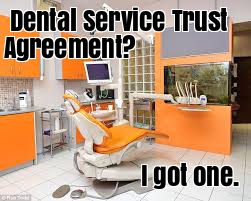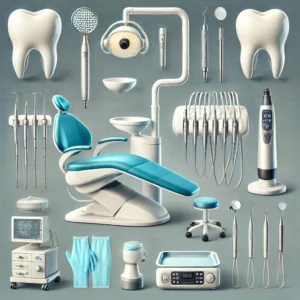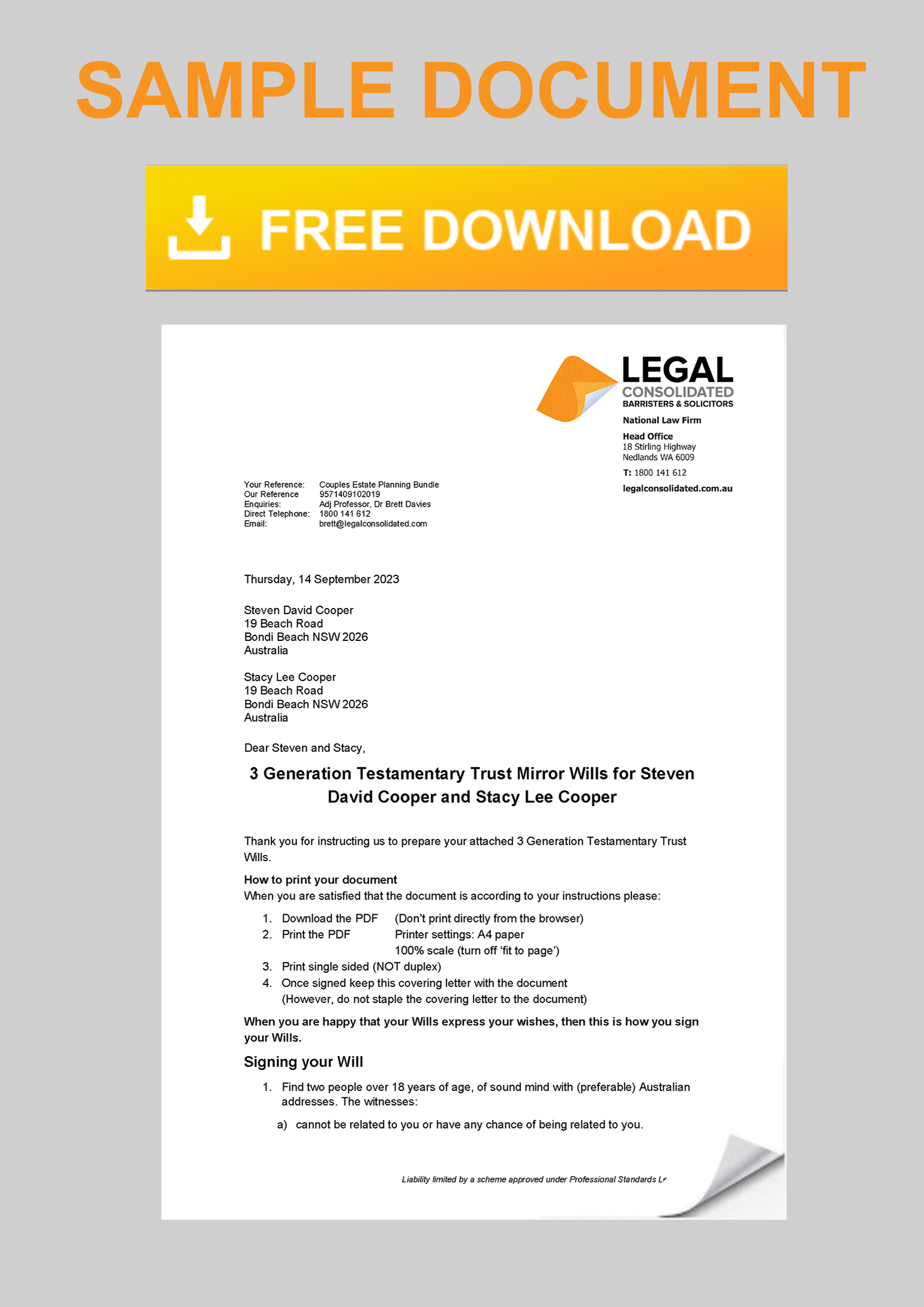Dentist Service Trust Agreement – the glue between the dental practice and the family trust
A service trust is a separate business entity. It provides services and goods to the dental practice. The second business is called a Dental Service Trust.
Common Business Structures for a Dental Service Trust
The service trust operates as a business. It provides services to dentists and charges a fee for these services. This includes equipment, staff, a receptionist, premises, and administration.
The three most common dental service trust structures are:
1. Family Trust – if just one dentist (the trustee of the Family Trust is a company)
2. Unit Trust – if two or more dentists (the trustee of the Unit Trust is a company)
3. Company – not common as profit is trapped and no CGT relief. But it is useful if you have no family because of the constant 30% tax rate
Build these three types of service trusts on our website. All three are designed to take advantage of Commissioner of Taxation v Fortunatow [2020] FCAFC 139 and Douglass v FCT [2019] FCA 1246.
Dental Service Trust as a second business
Any business can set up a second business. It is a way to move profit from the ‘main’ business to the second business.
Some professions find it difficult to share profits with their spouses and children. Therefore, dentists and most doctors, lawyers, accountants, financial planners, and engineers have service trusts.
A Dentist Service Trust moves profit to the service trust
The service trust is a second stand-alone business. It provides services to the dentist and charges a fee for those services.
Service Trust’s profits are then shared with the dentist’s spouse, children, bucket company, and family. Since they pay tax at a lower marginal rate, the service trust saves tax. It also helps with superannuation benefits and spreading income to family members.
Why Does a Dentist Service Trust Require a Service Trust Agreement?
Getting a service trust is not enough. You need a formal agreement between the dentist and the service trust, called a Dentist Service Trust Agreement.
The Dentist Service Trust Agreement is a contract. It allows the service trust to provide equipment, staff, reception services, premises, and administrative support to the dental practice.
Service Trust Agreements are also popular for:
- Other professionals, such as engineers, doctors, lawyers, and accountants, cannot easily share profits otherwise.
- Asset protection: One entity undertakes high-risk activities (employees, tenancies, and advice), while the other holds all the ‘good’ assets (land, intellectual property) in a low-risk entity.
- Companies want to liberate wealth and move profit into a trust structure. Unlike a company, the service trust can access the CGT tax concessions. Therefore, the service trust often holds appreciating assets. These include real estate, franchises, copyrights and ‘leased out’ business names.
Where is the tax advantage of a Service Trust for a Dental Practice?
The service trust is a business. The Dentist Service Trust Agreement provides services to dentists for a profit. The services are provided at ‘market rates’, as the ATO TR 2006/2 requires. The service trust then distributes the ‘profit’ it makes from running the service business. The profit goes to the dentist’s spouse, children, bucket company and other taxpayers at a lower tax rate.
Example of how a Dental Service Trust works
The dentist earns revenue of $1.6 million. Under the Dentist Service Trust Agreement, the Service Trust provides various support services to the dentist. These services include clinic cleaning, secretarial and nursing support, diary management, IT, marketing, office leasing, and bookkeeping. The Service Trust owns the equipment and employs all non-medical staff.
Under the agreement, the Dentist Service Trust charges the dentist $1.4 million in fees for these services.
After covering its own operational expenses of $600,000 (staff salaries, rent, supplies, etc.), the Service Trust generates a profit of $800,000. This profit is then distributed to the trust’s beneficiaries, who are typically the dentist’s spouse, adult children, or another family entity.
Financial Breakdown: The Impact of the Structure
Compare the financial outcome for the dentist’s family with and without the Service Trust arrangement. For simplicity, we will use illustrative tax figures.
Scenario 1: With the Dental Service Trust
-
Dentist’s Personal Income:
-
Gross Revenue:
$1,600,000 -
Less Service Fee Paid to Trust:
-$1,400,000 -
Dentist’s Taxable Income:
$200,000
-
-
Service Trust’s Profit:
-
Service Fees Received:
$1,400,000 -
Less Trust Expenses:
-$600,000 -
Trust Profit to be Distributed:
$800,000
-
-
Distribution to Beneficiaries:
-
The
$800,000profit is distributed to family members who are in lower tax brackets. Let’s assume it is split evenly between a spouse and two adult children (3 beneficiaries). -
Distribution per beneficiary:
$800,000 / 3 \approx $266,667each.
-
Result: Instead of one person being taxed on $1,000,000, four people (the dentist, spouse, and two children) are taxed on smaller amounts ($200,000 and $266,667 respectively). This significantly reduces the total amount of tax paid because it avoids having the bulk of the income taxed at the highest marginal tax rate.
Example of a Sole Practitioner Dentist without a Dentist Service Trust Agreement
- Dentist’s Business Income:
-
-
Gross Revenue:
$1,600,000 -
Less Business Expenses (same as trust expenses):
-$600,000 -
Dentist’s Taxable Income:
$1,000,000
-
Result: The entire $1,000,000 profit is taxed in the hands of one person, the dentist. A significant portion of this income would be subject to the highest marginal tax rate (47%, including the Medicare Levy in Australia).
Key Concepts and Benefits Illustrated of a Dentist having a service trust
-
Income Splitting: The primary benefit is tax effectiveness. The structure legally shifts a portion of the business profits from a high-income earner (the dentist) to beneficiaries (family members) who are on lower tax rates. This lowers the overall tax liability for the family unit.
-
Asset Protection: High-value assets like dental chairs, X-ray machines, and IT systems are owned by the trust, not the individual dentist. This legally separates the business assets from the practitioner. If the dentist were to be sued personally for malpractice, the assets held within the trust would generally be protected.
-
Wealth Creation: The trust becomes a separate entity for accumulating business wealth. This can be used for investment, future business expansion, or succession planning, all within a tax-effective and protected structure.
ATO Scrutiny of the dental practice sharing profit
These arrangements are closely monitored by the Australian Taxation Office (ATO). For the structure to be valid, it must adhere to strict guidelines:
-
Commerciality: The service fees charged by the trust must be commercially reasonable and at market rates. The
$1.4 millionfee in the example must be justifiable for the services, staff, and equipment provided. The ATO can invalidate the arrangement if the fees are artificially inflated simply to shift profit. -
Dominant Purpose: The arrangement must have a clear commercial purpose beyond just obtaining a tax benefit. The extensive services listed in the example (staff, equipment, administration) help establish this commercial purpose.
-
Proper Documentation: A legally sound Service Trust Agreement must be in place, clearly outlining the relationship, the services provided, and the fee structure.
But the dentist cannot share personal services income
Correct. The dentist cannot share personal services income. However, the income earned by the Service Trust is not usually classified as personal services income. The Service Trust operates as a separate business from the dentist’s medical practice and functions on an arm’s length basis. This allows the income to be distributed to related beneficiaries.
What is Personal Services Income (PSI) for a dentist?
PSI is income earned mainly from a dentist’s personal skills or efforts. For dentists, this typically includes fees for consultations, procedures, and other hands-on dental services. Under the ATO’s PSI rules, this income must be attributed to the individual earning it and cannot be split among family members or other entities for tax minimisation.
Key restrictions include:
- PSI cannot be distributed to family members or other beneficiaries.
- Deductions against PSI are limited, reducing opportunities for tax planning.
Dentists must ensure their practice complies with these rules to avoid penalties and scrutiny from the ATO.
This is why you must be careful when setting up the service trust entity and the contract between you and your service trust.
Is the Dentist Service Trust Agreement an Independent Contractors Agreement?
Yes. The Dentist Service Trust Agreement must be a legally enforceable Independent Contractors Agreement.
A Service Trust Agreement is a ‘contract for services’. It is the opposite of an employment contract. The agreement is structured as follows:
1. The Principal = dentist
The dentist is the principal. The dentist engages the contractor (e.g. Family Trust) through the Dentist Service Trust Agreement.
2. The Contractor = commonly a family trust or Unit Trust or a company
The contractor is the family trust, unit trust, or company providing goods and services. This contractor operates as a service trust. This is the second business.
3. The Relationship = independent
The service trust, as the second business, is independent. The second business is not an employee of the dentist. The independent contractors agreement formalises this independent relationship. It is the necessary glue between the dentist and the second business.
The Dentist Service Trust Agreement defines the scope of services and goods provided. It ensures the contractor operates independently and avoids the legal entanglements of employment.
What should the Service Trust charge?
Your accountant, each financial year, tells you what to charge. The Service Trust Agreement allows for this. You charge ‘market rates’. Treat the service trust as a separate, non-related business. The Service Trust Agreement allows the service trust to provide many services, including:
(a) plant and equipment (desks, chairs, medical equipment, dental chair, dental mirror, explorer tool, scaler, dental drill, suction device, curing light, X-ray machine, protective gloves, sterilisation tray)
suction device, curing light, X-ray machine, protective gloves, sterilisation tray)
(b) non-medical staff to the dentist (build Employment Contracts here) and security
(c) consumables
(d) the premises
(e) budgeting, forecasting, bookkeeping, accounting and debt collection services
(f) marketing, corporate design, identity and brand awareness
(g) additional services — as agreed by the parties from time to time
Does Legal Consolidated Endorse Mark-Ups for Service Trusts?
No, Legal Consolidated does not endorse markups for service trusts, nor does the Australian Tax Office (ATO).
A service trust is not a vehicle for artificially inflating costs. Instead, it operates as a second, stand-alone business. The service trust charges the principal (e.g., the dentist) at market rates for its goods and services.
Why Are Mark-Ups in Service Trusts Problematic?
The ATO scrutinises arrangements that artificially shift profits through mark-ups. Excessive fees attract allegations of tax avoidance or income splitting. The ATO audits these arrangements, imposes penalties, and disallows deductions. TR 2006/2 states:
6. While the [ATO] Commissioner accepts the correctness of the decision in Phillips, the case is not authority for the proposition that expenditure made under a service arrangement and calculated using the particular mark-ups adopted in that case will always be deductible under section 8-1 of the ITAA 1997.
31. Consequently, while the court in the Phillips case concluded that the particular arrangement under review was ‘commercial’ this does not mean that the decision stands as authority that the particular mark up percentages used in the arrangement will always be appropriate. Nor does it mean that expenditure to pay fees calculated by using those mark ups (sic) will always be deductible. [Italics added by Legal Consolidated]
The ATO is correctly looking for ‘commercial’ charging by this second business. Mark-ups are the wrong approach.
In Legal Consolidated’s view, the ATO is correct when it states regarding ‘commerciality’:
55. Pursuant to the agreement entered into on 1 July 2002, the Partnership paid the Services Trust substantial service fees on a fortnightly basis. The quantum of the fees was not calculated on the basis of work performed or services provided. The fees were instead calculated by applying specified mark-ups to almost all of the trust’s expenses. The fees charged were materially in excess of those charged by independent providers, and were arguably grossly excessive.
This has always been Legal Consolidated’s view. None of our service trust agreements or service trust vehicles has fallen foul of the ATO’s well-considered and clear ruling.
What does “Market Rates” for a service trust mean?
Market rates reflect the fair value of the goods and services provided. This includes:
- Equipment hire
- Administrative support
- Premises leasing
- Staff employment costs
The service trust must demonstrate that its fees align with what an independent third party would charge.
How do I update the Dentist Service Trust Agreement?
The Agreement is updated through an email exchange. As your accountant suggests, add more services. You can also add a scope of work, plans, diagrams, and specifications.
The Service Trust Agreement is silent on what it charges the dentist, so that information is never outdated. Your accountant advises you on the appropriate charges during the financial year.





